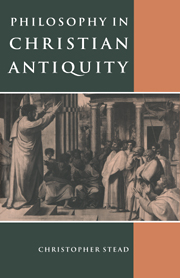Book contents
- Frontmatter
- Contents
- Preface
- List of abbreviations
- PART I THE PHILOSOPHICAL BACKGROUND
- PART II THE USE OF PHILOSOPHY IN CHRISTIAN THEOLOGY
- 8 The debate about Christian philosophy
- 9 Greek and Hebrew conceptions of God
- 10 Proofs of the existence of God
- 11 God as simple unchanging Being
- 12 How God is described
- 13 Logos and Spirit
- 14 Unity of substance
- 15 Substance and Persons
- 16 Christ as God and Man
- 17 Two natures united
- PART III AUGUSTINE
- Bibliography
- Index of Names
- Index of Subjects
17 - Two natures united
Published online by Cambridge University Press: 29 September 2009
- Frontmatter
- Contents
- Preface
- List of abbreviations
- PART I THE PHILOSOPHICAL BACKGROUND
- PART II THE USE OF PHILOSOPHY IN CHRISTIAN THEOLOGY
- 8 The debate about Christian philosophy
- 9 Greek and Hebrew conceptions of God
- 10 Proofs of the existence of God
- 11 God as simple unchanging Being
- 12 How God is described
- 13 Logos and Spirit
- 14 Unity of substance
- 15 Substance and Persons
- 16 Christ as God and Man
- 17 Two natures united
- PART III AUGUSTINE
- Bibliography
- Index of Names
- Index of Subjects
Summary
The Chalcedonian Definition presents Christ as a union of two disparate natures, divine and human. We move now towards critical discussion, and identify three problems to be considered. First, are the two natures themselves compatible, or do they have to be considered as polar opposites, so that their union is in logic ruled out as self-contradictory? Secondly, what is the value of the terms and analogies in which their union has been conceived? Thirdly, what is meant by the claim that the Lord's humanity was ‘anhypostatic’ or impersonal? We shall try to deal with these problems in order; but it will not be possible to separate them completely.
(1) We may take the natures in turn. On the divine nature there is a large measure of agreement, inspired in the main by Platonic theology. God is incorporeal, good and wise. Gregory of Nyssa no doubt introduced a new factor by describing God as infinite; but this is a natural extension of the common belief in God's total transcendence of the created order. What concerns us now is the doctrine that God is strictly impassible and immutable (see pp. 128–30). How then can he relate himself to events in time? The difficulty is perhaps avoidable in the case of the Creation, since this can be viewed as the beginning of time; but the Incarnation implies that God took action at a moment in history. This raises two distinct problems: first the general problem, how can God act on the world at all without acquiring new, and therefore changed, perceptions and relationships? Secondly, the specific problem, how can a divine being enter human life without himself suffering a change?
- Type
- Chapter
- Information
- Philosophy in Christian Antiquity , pp. 202 - 216Publisher: Cambridge University PressPrint publication year: 1994



